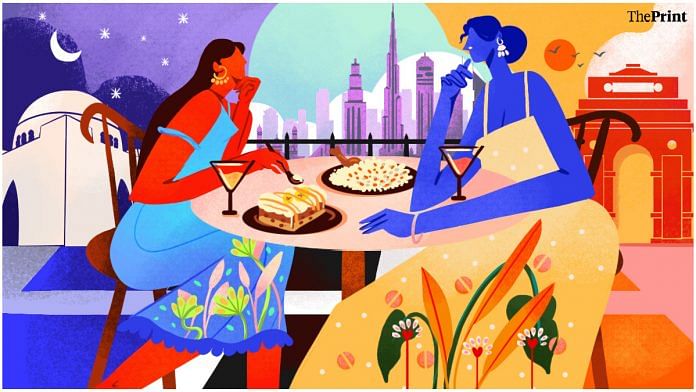Before moving to Dubai, I barely had any Indian friends. Living in Lahore, I did meet a few lively Sikh yatris travelling from one part of Punjab to another to visit their holy places. Pakistan of the ’90s was quite unlike what children experience today. Sikh yatris would merrily roam the streets of Anarkali Bazar in Lahore chatting and mingling with the locals. Being the granddaughter of immigrants from Jhajjar who took deep pride in their Haryanvi roots, I also knew pre-Partition India through my grandmother’s eyes. However, the post-9/11 world presented different realities and things changed. The tensions between India and Pakistan also heightened. The walls and fences became higher.
My first friend in Dubai was my Indian neighbour Mini who helped me settle in a new country in every possible way. From handing me the number of the guy who delivered water cans to encouraging me to start my own food catering business, Mini made my life in Dubai seem much easier than it was. Through Mini, I got to know more women in the neighbourhood who were also Indians.
We were a subject of interest for our respective mothers back home and while visiting Dubai. I remember one of my friends sending my photograph to her mother in Nagpur to show her how a Pakistani girl looked! Of course, I was a rare specimen for her family back home. We both laughed when she hit the send button on WhatsApp. My mother in Lahore was elated to know that I was making friends from India and would often ask me about them. Now when I come to think of it, I realise that she did so because this was the closest that she could feel to the country her parents came from. Even when she visited me once in Dubai, all my mother wanted was to have food at the Indian restaurants because she loved the Indian thali.
In due course, Priya, who was from Kerala, became my best friend in Dubai. We had set up this unsaid birthday ritual of cutting our cakes together. On one of those occasions, Priya’s mother was also visiting from India. “Auntie” was a quiet person but the whole act made her so happy that she recorded a video of us cutting Priya’s birthday cake. We chuckled at how it would potentially turn into a WhatsApp message forwarded to the entire clan.
Also read: C-Voter survey shows what Indians feel about China, Bangladesh and Pakistan. It’s startling
Our grandmothers’ wildest dreams
Interestingly, despite being among the first of their Pakistani friends, the Indian-Pakistani distinction diminished in no time. Initially, we avoided talking about anything that could potentially lead to a conflict. In fact, we were more polite to each other than we were to people from our own countries. But this is not how genuine friendships work. Soon the inhibitions started falling off and we initiated deeper conversations. We would discuss everything under the sun from the role of patriarchy in governing our lives to the politics that had crippled the lives of the common people. It did not take us long to realise that our similarities are much deeper than our differences.
When I started my catering business, my first client was an Indian, Nahid Sabir who asked me to make her biryani and banoffee pie. She loved my food so much that soon I started receiving orders from many other people in the community. My very Pakistani biryani was an instant hit among my Indian clientele. Many would also order vegetarian options, which I was happy to explore and create. Not only food, but our families were also not much different. Many of us had similar experiences with our ‘in-laws’. We found more comfort in our mothers’ homes than with the ‘in-laws’. Most of us dreaded trips back home because we had found our peace in a life away from the chaos in our own countries. We wanted to break free and live our lives on our own terms. Why am I forgetting the Bollywood films and Pakistani dramas? Most of my Indian friends could not help gushing over Fawad Khan!
Through these friendships we were living our grandmothers’ wildest dreams; the women who had to leave their homes to migrate to lands unknown in 1947. Perhaps we were the manifestation of our dead ancestors’ longing to see their old home, mohallas, and friends.
Also read: A Pakistani friendship meme broke the internet. Now it makes a new record
Friends without borders
The stereotypes we had about each other’s cultures and countries came crumbling down through these friendships. I am sure that none of my Indian friends thinks that Pakistani women remain within the confines of their homes wearing a burka. I am also not of the view that all Indian women wear bindi and saris. Some of my friends have never worn a sari their entire lives.
When I was leaving Dubai for Australia, we had tears in our eyes. We knew that despite being just a few kilometres away from each other in our home countries, we might never be able to visit each other. To see each other we had to travel thousands of miles. Perhaps we would never have known the joy of our precious friendships had we not lived together in Dubai. These walls would have never come down had we not stepped away from home and met on these foreign lands. For each of us, the future is brighter now, but we still must travel a thousand miles to hug our friends from the other side of the border.
Saadia Ahmed is a storyteller and researcher from Lahore, now based in Australia. A trained architect, Saadia has decided to pursue her passion for teaching creative writing and drama to children. She tweets @khwamkhwah. Views are personal.
(Edited by Neera Majumdar)



